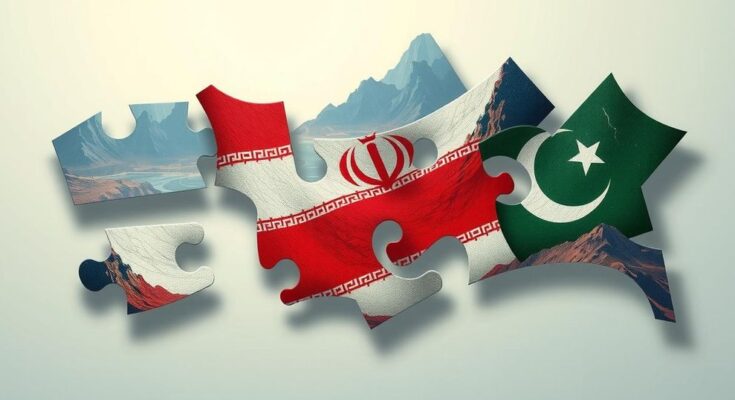Iran and Pakistan are enduring severe challenges related to terrorism, particularly along the shared border in regions like Sistan and Baluchestan. Recent interviews with experts highlight the rising threat of terrorist organizations in these areas and the necessity for enhanced cooperation between the two countries. Despite previous agreements, effective implementation and mutual understanding remain crucial for establishing collaborative security strategies.
Recent data from the Encyclopedia of Terror Victims in Iran reveals that the nation has suffered over 23,000 casualties due to terrorism and counterterrorism initiatives since the Islamic Revolution, making it one of the most affected countries alongside Pakistan. Iran’s southeastern region, particularly Sistan and Baluchestan province, has witnessed a sharp increase in terrorist activities, with incidents rising by 115% and casualties by 200% within the past year. In 2022, this province accounted for 68% of all terrorist activities in Iran.
Amid these escalating threats, the Tehran Times interviewed Muhammad Murtaza, a prominent analyst focused on regional security, regional connectivity, and violent extremism. The discussion examined Iran and Pakistan’s shared challenges regarding terrorism, specifically the dynamics of terrorist activities and potential collaborative strategies to enhance security in the border regions.
Murtaza provided an overview of the current terrorism situation in Pakistan, indicating the increasingly deteriorating security following the Taliban’s takeover in Afghanistan. Key terrorist groups in Pakistan include Tehrik-e-Taliban Pakistan (TTP) and the Balochistan Liberation Army (BLA), with a noted rise in attacks since August 2021, emphasizing the shift towards targeted operations. In 2024, aggressive counter-terrorism operations were introduced, underscoring Pakistan’s urgent need to address internal threats.
He indicated that the terrorist groups benefit from various financial sources, including charities, hawala networks, extortion, and ransom payments. Although external support exists for these terrorist organizations, pinpointing specific sponsors remains complex due to the intricate funding mechanisms. Notably, criminal networks often collaborate with terrorist groups, forming a nexus that sustains their activities.
Murtaza highlighted the main obstacles to closer Iran-Pakistan cooperation in countering terrorism, primarily the differences in security focuses. While Pakistan concentrates on groups like TTP, Iran faces threats from organizations such as Jaish al-Adl. Increasing coordination and intelligence sharing is needed between the two nations to effectively address regional security threats.
While a security agreement was signed between Iran and Pakistan in 2014 to foster counterterrorism collaboration, the practical implementation of such agreements remains challenging. Murtaza remarked on the recent kinetic activities carried out by both nations on each other’s territories, revealing the complexities of their border security dynamics, stemming from each country’s independent counter-terrorism actions.
The roles of external powers, including the United States and Saudi Arabia, play a substantial part in shaping Iran-Pakistan relations. While Pakistan fosters strong ties with these nations, Iran maintains closer relations with India. Such affiliations have at times fueled security tensions along the border, complicating the prospect of mutual efforts toward peace and stability.
Regarding recent developments, Murtaza suggested that bilateral cooperation encompassing political, security, economic, and cultural dimensions would be beneficial in addressing terrorism in the region. Credible confidence-building measures between Iran and Pakistan are essential for overcoming distrust and establishing cooperative relations to tackle common challenges effectively.
In conclusion, the rise in terrorist activities along the Iran-Pakistan border poses a significant regional security challenge that necessitates cooperative measures between the two countries. While both nations face unique threats, intelligence sharing and better coordination are vital for improving their counterterrorism frameworks. Addressing financial support for these groups and navigating external influences will further bolster their joint efforts against prevalent terrorist threats.
Original Source: www.tehrantimes.com




